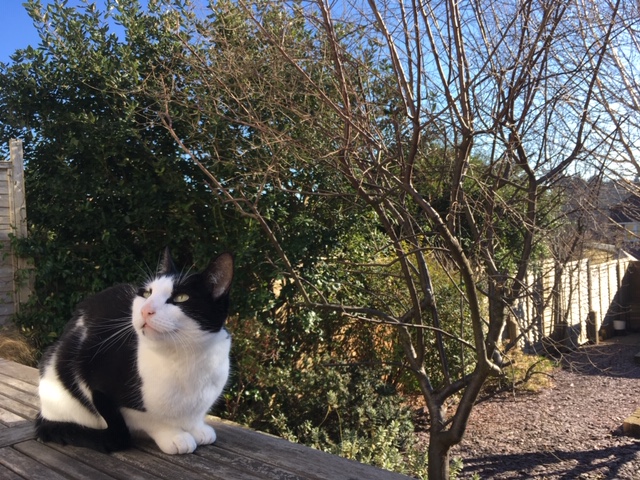Living in the now
A cat fulfilling its role
Sophie enjoys being out in the spring sunshine but takes her duties seriously. She’s had food and water so – as far as I can tell – her number one task is to ensure other cats don’t enter her territory. She accomplishes this job very well by remaining alert, ready, and waiting for action. She can’t do so many things, but the roles she knows, she performs very well indeed.
I, as a human, am very different. I can do some things very well. On the other hand, I can do many things not very well at all! Humans are great imitators, but this means we pick up bad, as well as good, habits. We begin to learn things we don’t actually need to learn and we get bored. Sometimes we become totally obsessed with a skill or activity and practise it to the exclusion of all else.
Humans are affected by the past and the future
One of our main problems/attributes is our ability to remember the past and plan for the future. This gives us pain as well as pleasure and gives us worry as well as a sense of being in control.
Sophie lives in the moment. She doesn’t tense up to fight off an intruder unless one actually enters her space. As long as no other cat appears she can enjoy the day. You’ll see in the photos how she decides to enjoy a roll and a tummy tickle, but she’ll still be listening for intruders.
We humans have to make a special effort to live in the moment. And what we think tends to affect our postural tone. When someone you know well enters the house after a day at work their footsteps often betray how their day has been.
Our challenge as humans is to find balance between reacting only as things happen (we do need to organise our lives) and endlessly chewing over problems whilst allowing our muscles to become more and more tense and painful.
Notice how your thoughts affect your physical well-being
Alexander Technique can help with this dilemma. It teaches us to be more aware of what’s happening within ourselves. Once we notice we’re tensing up in response to our thoughts we can decide whether or not we want to allow it to continue happening. If we decide it’s not a useful response we can train ourselves out of it. Many people find that carrying less tension in their bodies allows their minds to calm as well, and so the cycle of stimulus-response begins to lose its power.

